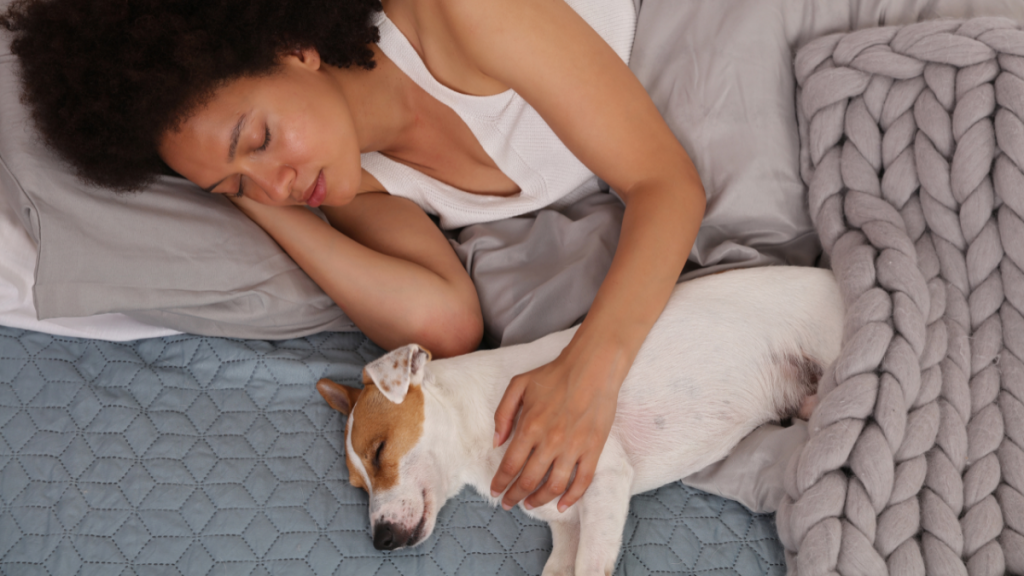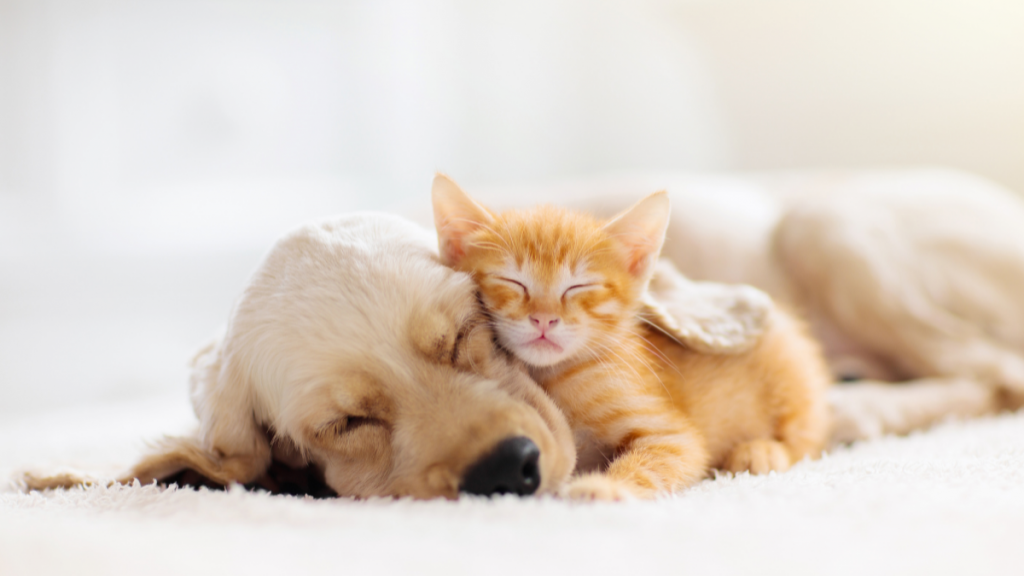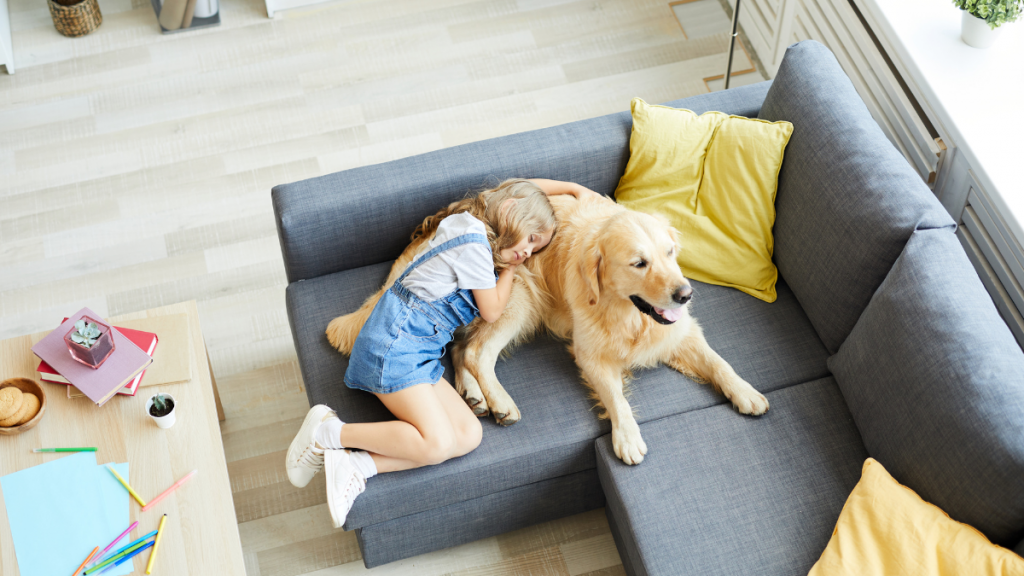Health
Sleeping with your pet: the pros and cons
Find out everything you need to know about the pros and cons of sharing your bed with your pet, including how it can affect your health and sleeping habits.
Advertisement
Is it a good idea or not to share the same bed with your cat or dog?

Chances are you probably consider your furry friend to be a member of the family. But is sleeping with your pet really such a good idea?
Like any other family member, you may enjoy spending quality time with them. Sometimes it includes sleeping in the same bed.
Getting your cat or your dog to sleep in their own bed might be tough. After all, they’re cute, they’re cuddly and it might seem impossible to say ‘no’ to their adorable little faces whenever they join you before sleep.
However, it might be a good idea to keep them out of your bed.
The reasons are plenty, but ultimately, it’s almost impossible to get a full night of rest by sleeping with your pet. Like newborn babies, pets will wake you up during the night and disturb your slumber.
If you already have a pet, or if you’re considering getting one soon, it’s important to consider your sleeping arrangements. Of course it all comes down to a personal choice.
Nevertheless, if you’re looking to know more about the highlights and lowlights of sleeping with your pet, keep reading the content below.
The disadvantages of sleeping with your pet
Cuddling with your furry friend at night might sound joyful. However, sleeping with your pet may have some hidden disadvantages you haven’t considered.
Pets can certainly provide comfort and security, but there are a few things to think about before bedding down with them. Here are some potential downsides to sleeping with your pet.
You will be redirected to another website
By submitting this form, I agree that I am 18+ years old and I agree to the Privacy Policy and Terms and Conditions. I also provide my signature giving express consent to receive marketing communications via automated emails, SMS or MMS text messages and other forms of communication regarding financial products such as credit card and loans. Message frequency varies and represents our good faith effort to reach you regarding your inquiry. Message and data rates may apply. Text HELP for help or text STOP to cancel. I understand that my consent to receive communications is not a condition of purchase and I may revoke my consent at any time.
Disrupting your sleep

Many pet owners enjoy sleeping with their animal companions, but there are some disadvantages to this practice.
One potential issue is sleep disruption. Pets can move around during the night, making it difficult to get a restful night’s sleep.
A study conducted by the Mayo Clinic found that nearly one in three people who slept with their pets reported experiencing disturbed sleep.
This is attributed to a variety of factors, including being awoken by pet movements or sounds.
In addition, pets may need to go outside to relieve themselves, which can also disrupt your sleep schedule.
If you have a pet that snores, this can be yet another source of noise that makes it difficult to get a good night’s rest.
Allergies, bacteria and more
For many people, sleeping with their pet is a nightly ritual. However, there are some potential drawbacks to this practice that are downright detrimental to your health. Dander, for instance.
Dander exists because of dead skin cells, and it can be a major trigger for allergies. When sleeping with your pet, you are exposed to dander all night long, which can result in sneezing, congestion, and other symptoms.
Additionally, pets often carry dust and pollen on their fur, which can also cause allergic reactions. If you suffer from allergies, sleeping with your pet may not be the best option.
Another consideration is hygiene. Pets can carry a variety of bacteria on their fur, which can be transferred to your sheets and pillowcase.
If you have any open cuts or scratches, sleeping with your pet may increase your risk of infection.
Safety of the pet (and yours)
One of the main drawbacks is that it can be unsafe for your pet. If you have a small animal, there is a risk that you could roll over and crush it during the night.
Even larger animals can be injured if they are stepped on or if they become tangled in blankets.
Animals are often attracted to the warmth of a bed and may want to curl up next to you or even underneath the covers.
This can present a suffocation risk, especially for small pets such as kittens or puppies.
Your pet may also inadvertently kick or scratch you in their sleep, which can lead to injury.
The advantages of sleeping with your pet

There are many benefits to sleeping with your pet. One of the most obvious is the companionship it provides. If you’re someone who gets lonely at night, sleeping with your pet can help ease that loneliness.
Sleeping with your pet can also provide a sense of security. Having a furry friend by your side can make you feel safe and protected. Additionally, sleeping with your pet can help reduce stress and anxiety.
Studies have shown that snuggling with a furry friend can help lower blood pressure and heart rate, and promote relaxation
Finally, sleeping with your pet can simply be enjoyable. Snuggling up with your pet at night can be a delightful way to end the day.
The pros of getting your pets their own sleeping space
Pets are like family members, and just like human family members, they need their own space to sleep.
Many people allow their pets to sleep in their bed with them, but this can actually be detrimental to both you and your pet’s health.
Getting your pet their own bed may seem like an unnecessary expense, but there are actually many benefits to doing so.
For one thing, it can help to keep your own bed free of pet hair. It can also create a sense of boundaries for your pet.
Pets can also suffer from sleeping disorders just like humans, so having their own bed gives them a sense of security and allows them to sleep more soundly.
And if you ever need to travel without your pet, you’ll have peace of mind knowing that they’re sleeping in their own bed at home.
Ultimately, getting your pet their own bed is a win-win for both of you.
What animals make funny noises?
When it comes to animals, there are a lot of different noises that they can make.
Some animals make noises that are meant to be soothing, while others make noises that are meant to be warning signs.
However, some animals make noises that are just plain funny.
To learn more about them and why they vocalize in such a funny way, follow the link below and we’ll tell you more.

What animals make funny noises?
Laugh at the weird and wacky noises that different animals make – from lions to crickets, these animals make funny sounds!
Trending Topics

See your customized Spotify Upside Down Playlist
Ready for 'Stranger Things 4'? Check out Spotify’s personalized Upside Down Playlist, made just for you! Read on for more.
Keep Reading
See how to apply for the FIT® Platinum Mastercard®
Learn how to apply for the FIT® Platinum Mastercard®. And regain control of your finances with this credit card can!
Keep Reading
Bank of America® Travel Rewards Credit Card review
Read our Bank of America® Travel Rewards Credit Card review to learn about its perks and benefits, and what it can do for your wallet!
Keep ReadingYou may also like

See how to apply for the OpenSky® Secured Visa® Credit Card
Wondering how to apply for the OpenSky® Secured Visa® credit card? This step-by-step guide will show you how easy it is!
Keep Reading
Are streaming costs affecting your budget?
Are streaming costs becoming too much for you? There are a few tricks you can try to bring the value down without sacrificing entertainment.
Keep Reading
2 new binge-worthy podcasts of 2022
Here’s a quick guide on 2 superbly addictive and entertaining podcasts you should be listening to right now. Keep reading to learn more!
Keep Reading